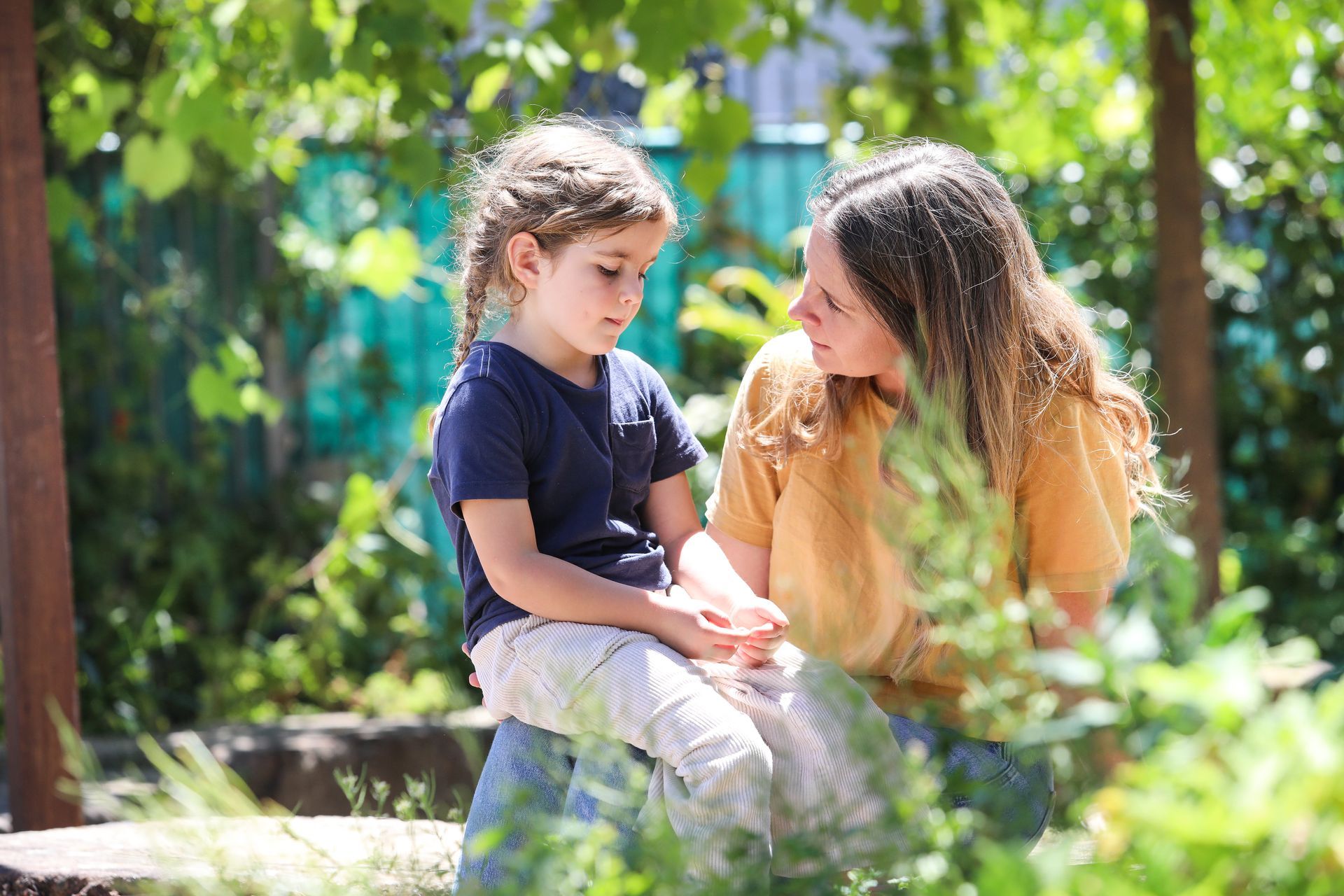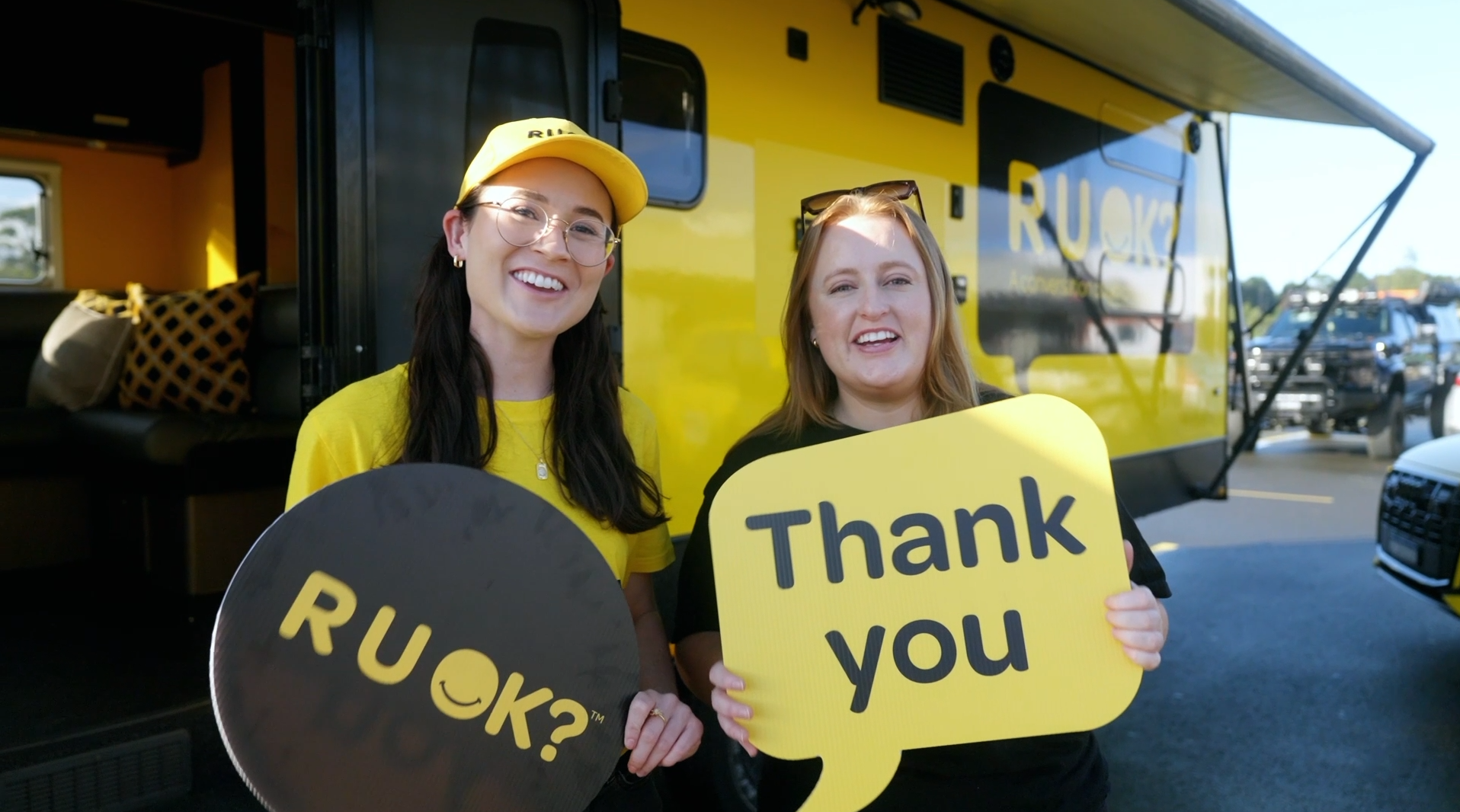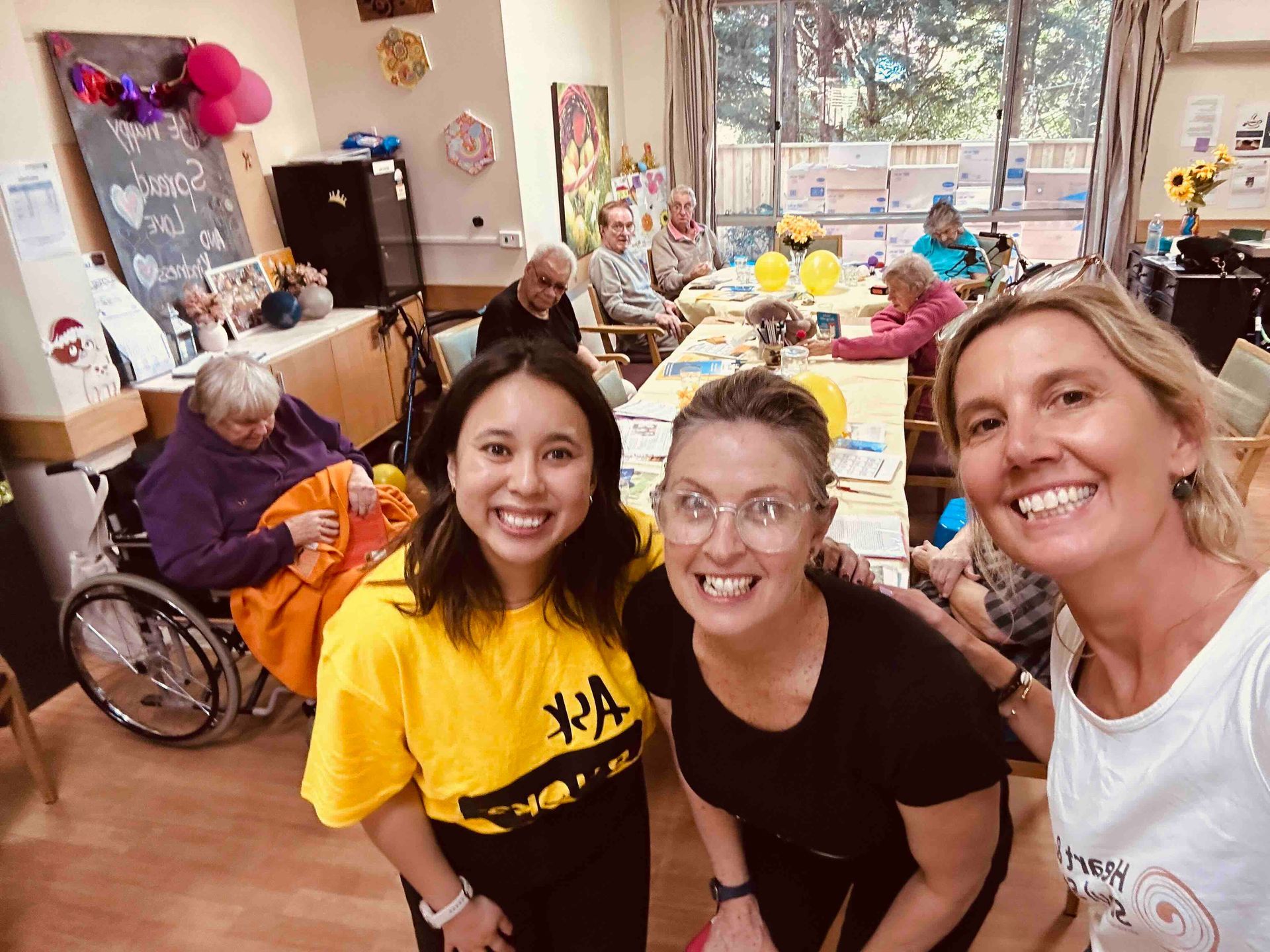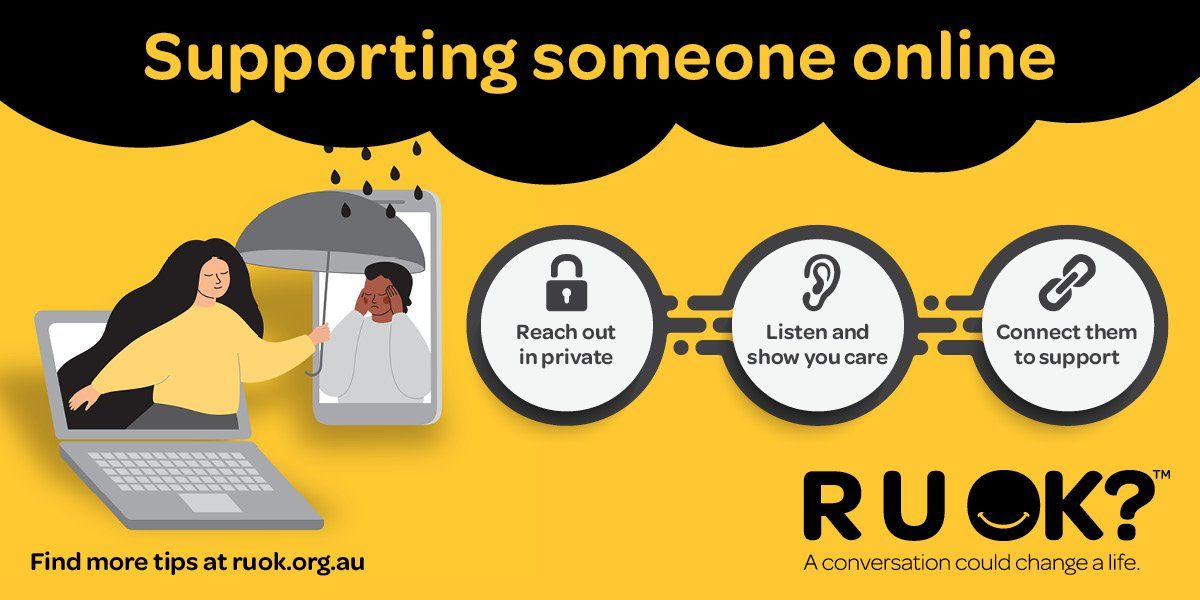Tips for talking to someone online
This guide has been developed by R U OK?, an Australian suicide prevention charity with a focus on encouraging people to connect and start meaningful conversations.
Being a great mate means supporting someone when they’re facing life’s ups and downs. It can start with asking them how they’re going and listening to them. Some people might feel more comfortable or find it easier to open up and share how they’re really feeling online.
When we’re online we can connect with our friends, family and workmates but also people we haven’t spoken to in years or don’t know that well. Whatever our relationship is, when someone posts or shares something online that looks like a cry for help it can make you worry, and you may be unsure what to do.
The following tips are a guide for what to say to someone who needs some help or support online, we’ve also got some useful resources if you or someone you know needs professional support.
Tips for supporting someone online
What should I look out for?
It’s about trusting your gut instinct when you feel something’s not quite right or feel someone might need some extra support. However, things to look out for may include:
- They’re sharing content, like music lyrics or poems, that sound sad or upsetting.
- They’ve stopped responding to messages or have become less active or more withdrawn online. You may notice that they’re posting more or less content than usual.
- Their appearance has changed. They might look more dishevelled or tired in pictures.
- The times they are posting or sharing content has changed. You may have noticed they’re posting very early in the morning or late at night when they would normally be sleeping.
- They seem to be experiencing changes in their mood. They may sound sad, angry or lonely.
- They’re struggling to cope with their problems or feelings.
- Images or posts that suggest they may be self-harming or injuring themselves.
- They’ve said they want to die, can’t do this anymore or are thinking about suicide.
It’s OK to reach out
Don’t think you’ll make things worse by reaching out if you do it in a genuine way.
If you don’t know the person well enough, the fact they’ve shared that they’re struggling publicly may indicate that they’re not comfortable asking the people they see regularly for help directly or may not be getting the support they need in real life.
If you know someone in their social network you can reach out to them and say something like, "Hey, I'm worried about Alec's post, but I don't know him well enough to offer the support he needs. How do you think we can get him help?"
If the person who’s struggling has reached out to you directly, perhaps over direct message, that’s a good sign they’re comfortable sharing what they’re going through with you and think you may be a source of comfort and support.
Remember, it’s the act of reaching out that matters most. What people who’ve experienced distress have told us is that it’s less about the words and more about the intent. Try not to focus on finding the perfect words but on showing you genuinely care and are concerned about this person.
Reach out in private
While someone might be expressing their emotions publicly, it’s best to provide support in private so your friend feels safe opening up to you. Sending a private message online is a good place to start. You could write, “I saw your post and I want you to know I’m here if you want to talk.” But if you can it’s best to give them a call or send them a text. If you don’t have their number saved you can see if that’s an option by saying something like, “I can give you a call or we can chat over text if you’d like? What’s your number?”
If they don’t want to talk to you, encourage them to open up to someone they trust by asking them who they might feel more comfortable chatting with.
What happens if I can’t direct message someone privately?
You might respond to their post or content with something like, “I’m worried about you and concerned for your safety. If you’re in Australia I urge you to call 000 or Lifeline on 13 11 14.” If you think someone is at risk, encourage them to connect with emergency services or a helpline.
Listen
The simple act of asking someone how they’re doing, with an open-ended question, like “Are you OK?”, shows that you care. It’s important you give them space to share and respond to your questions so don’t offer your opinion before they’ve responded. Once they’ve started responding, ask simple follow-up questions like, “Have you been feeling this way for a while?”, “What does that feel like?” or “What has been on your mind as you’re going through this?” This communicates that you genuinely want to know how they’re really doing.
Whether in person or in writing, saying things like “I understand” and “I’m listening” can make them feel heard and show you genuinely care. You can also say or write things like “I’m sad that you’re in so much pain right now” or “You’re in such a tough situation” to show you’re trying to understand what they’re feeling or going through.
Connect them to support
Before or as you’re talking to your friend research organisations or resources that may help them manage what they’re going through or feeling. You can find some resources at the end of this guide or at www.ruok.org.au/findhelp
Remember that, you cannot fix the person or control what they do in the future. Your role is simply to be positive about taking steps to find support and providing some options for where they could go for that support.
Look after yourself
Talking or interacting with someone online who is struggling or in distress can be hard. It is especially hard if you are not sure where they live or are unable check in with them later.
After the conversation, doing something you enjoy can help you relax and release some of the heightened emotions you might be feeling. You might want to go for a walk, have a bath or listen to some uplifting music. It can also help to debrief the conversation with someone you trust like a friend, parent or a service like Lifeline, which is available 24/7 on 13 11 14 (Aust. only).
Remember, you’re not responsible for how your friend feels or their actions. You can only encourage them to seek support if they need it.
I’m worried about their safety
If you're worried that the person you are chatting with online might be thinking about suicide, don't be afraid to ask them directly. Asking the question does not lead to suicide.
It’s not an easy question to ask, so if you don’t feel confident, a good first step is to call a crisis helpline to seek some immediate advice – you can find a list of available services at the end of this guide or at www.ruok.org.au/findhelp
How do I ask directly if they’re having thoughts of suicide?
You might say something like: “I just wanted to check in because you posted (image of message) and I’m worried about you. It sounds like you might be feeling suicidal, is that the case?” If they say yes, the most important things for you to do are to:
1. Contact the person’s family or someone in their social network
2. Get immediate professional help for them.
Getting them to professional help can start with any of these options:
· Calling a crisis support line.
· Encouraging them to go to a hospital emergency department. If you are able to you should take them there.
If you’re concerned for their immediate safety and they aren’t responding to you, you’re unable to connect with anyone in their family or social network, or they’re refusing to contact emergency services, you should:
· Call emergency services on their behalf
If you contact emergency services on the person’s behalf, keep the person at risk informed about what is happening, unless this might increase the risk to them or someone else. If possible, try to maintain a conversation with the person until help arrives. Be prepared to provide emergency services with the following information:
• Your name and contact details.
• The fact that someone has told you online they have a plan to end their life or are in the process of making a suicide attempt.
• What the person online has said that indicates that they are at immediate risk of suicide.
• The date and time of their post.
• The person’s identity and current location, if you know this information. You may need to look at their social media accounts to get this information.
You may be concerned about contacting emergency services, but they are well placed to respond quickly and conduct a welfare check to check on the safety and wellbeing of the person at risk.
Once you have contacted emergency services you should report the content to the social media sites safety team.
Depending on the site’s policy, they may reach out to the person to offer help, remove content that may be upsetting to others, or contact emergency services in the person’s area to get help for them.
You can usually find information on how to report content by searching “Reporting suicidal content on [insert channel name]” in your browser.
Learn more about communicating safely about suicide and reporting concerning social media content in Orygen's #chatsafe guidelines at https://www.orygen.org.au/chatsafe
Useful contacts for someone who’s not OK
Encourage them to call on these Australian crisis lines and professionals:
Lifeline (24/7 )
13 11 14
Kids Helpline
kidshelpline.com.au
1800 55 1800
Suicide Call Back Service (24/7)
1300 659 467
Beyond Blue (24/7)
1300 224 636
Mensline (24/7)
1300 78 99 78
mensline.org.au
Head to Health
A directory of digital mental health services and resources
More contacts: ruok.org.au/findhelp
Useful contacts for someone providing support
Family and friends can also call upon the services listed above for advice and assistance on how to support someone who is struggling with life.
#chatsafe has tools and tips to help young people communicate safely about suicide online.
This resource was reviewed by Ann-Maree Fardell Hartley, Registered Psychologist and Suicidologist






















